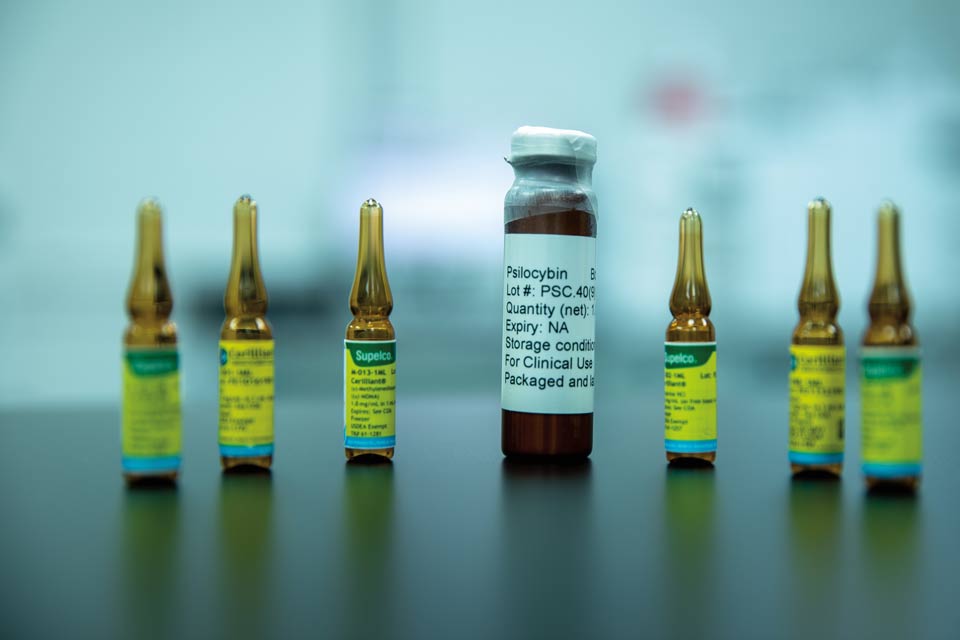Psychedelics revisited
- Michael Kissinger

Could magic mushrooms and ecstasy reshape mental health care in Canada? Two UVic grads weigh in from the frontlines of the psychedelic renaissance.
Once relegated to the far-out domain of Deadheads and counterculture folk looking to turn on, tune in and drop out, psychedelic drugs are having a moment again. But don’t call it a comeback—or even a flashback. Two UVic alumni are among the researchers studying the potential of psychedelic-assisted therapies for use in hard-to-treat conditions. In fact, they say, these misunderstood medications could launch a paradigm shift in mental-health treatment in Canada.
Collaborative effort
David Clements, BA ’97, readily acknowledges his journey from the ink-stained ’zine-laden scene of the UVic Writing program to the vanguard of a scientific movement isn’t your typical career trajectory. But the executive director of Psychedelics Research at Queen’s University’s Faculty of Health Sciences says those heady, pre-Woodstock ’99 days of co-editing UVic’s the Martlet and writing for the Ring laid the foundation in many ways for his current gig.
“Some of what I really love doing now I learned a lot about at that period of time,” Clements says. “When I was at the Ring, the editor would give me the names of certain scientists doing things, and they’d say, ‘Well, why don’t you follow up with this person about this project or area,’ and I realized I loved it. I love working with scientists, and I love being able to add the skills that I have in areas like policy, communications, planning, and so on, to be able to increase the impact of their work.”
Initially, Clements had his sights set on the world of journalism. But a communications job in the health sector proved “transformative,” and he would spend the next twenty years in Ottawa in various senior roles around health policy and communications, including a stint as senior advisor and communications director for then-Minister of Health Dr. Jane Philpott.
After three years with the Canadian Institutes of Health Research, followed by a position at Health Canada as a director general for health care strategies, Clements is now working for his old boss again—Philpott is dean of the Faculty of Health Sciences at Queen’s University.
This summer, the faculty announced it was creating a research collaborative to support research and innovation in psychedelic-focused therapies. The work is supported with a fund established by Dimensions Health Centres, a psychedelic wellness company.
[The] terminology was really intentional.It is truly collaborative in the sense that we’re looking at connecting folks that may have been doing this work in a very disconnected way previously. So, introducing those folks to each other, facilitating collaboration not only at Queen’s but also with scientists and other institutions, to be able to move the science forward in the area of psychedelics as rapidly as we can.”
—David Clements
Doors of perception
The use of psychedelics is nothing new. Plants with psychedelic properties have been used for thousands of years in different cultures as part of religious ceremonies, rituals and for their supposed transcendental and healing powers. Psychedelic research, particularly around LSD, flourished in universities and labs during the 1950s and ’60s. These studies in the fields of psychiatry, psychology, psychotherapy and neuroscience showed encouraging results. But enthusiasm for these mind-altering substances soon spread beyond the lab and found its most vocal and provocative proponents in the counterculture and anti-Vietnam War movements, triggering a backlash that would last decades. In 1970, the US government under President Richard Nixon criminalized all uses of psychedelics, shutting down sanctioned psychedelic research. Countries around the world followed suit, and psychedelics later got caught up in another costly and intractable conflict—the so-called “war on drugs.”
In recent years, however, shifting demographics, increased scrutiny of conventional approaches to mental-health treatment and a growing body of research on psychedelic-assisted therapy’s impact on depression, PTSD, addiction and end-of-life anxiety have led to what many are calling a psychedelic renaissance.
For many years, this work was led by underground therapists, but Clements points to Michael Pollan’s best-selling 2018 book How to Change Your Mind: What the New Science of Psychedelics Teaches Us About Consciousness, Dying, Addiction, Depression, and Transcendence as another watershed moment in the psychedelic movement.
And while Clements is excited about the ever-evolving landscape of psychedelics and its possible implications for mental-health treatment in the future, he stresses that enthusiasm needs to be balanced by science and research-informed policy.
“One of the things that we’re seeing right now is the emergence of a number of small and medium-size enterprises that are working in this space… I’m learning about a new one every month,” Clements says. He applauds the innovation and creativity in the sector, but stresses the importance of ensuring that a strong scientific base is in place to support future change in policy and clinical practice. He also notes the importance of providing clear, evidence-based messages to patients and the public, tempering overenthusiasm from those who might see psychedelics as a mental-health panacea.
‘A new way of thinking’
One of the more prominent players to emerge on the Canadian scene is Numinus Wellness Inc.
In June, the Vancouver-based enterprise specializing in psychedelic research became the first publicly traded company granted a license from Health Canada to conduct research to standardize the production and extraction of psilocybin, the active ingredient in “magic mushrooms.” The research is conducted in a lab in Nanaimo, BC. Numinus has also received Health Canada approval to study Methylenedioxymethamphetamine- or MDMA-assisted therapy for post-traumatic stress disorder (PTSD). The drug commonly known as “Ecstasy” or “Molly” will be studied in collaboration with the California-based non-profit MAPS (Multidisciplinary Association for Psychedelic Studies), which has been leading the charge internationally in psychedelic research since it was founded in 1986.
So far, the findings have been promising. Results from a MAPS’ Phase 3 clinical trial, published in Nature Medicine this past spring, showed that 67 per cent of PTSD sufferers who had MDMA with an intensive course of psychotherapy no longer qualified for a PTSD diagnosis following the trial. Overseeing Numinus’s expansion into this research market is Dr. Evan Wood, BSc ’97. The UVic social sciences grad has taken an unpaid leave from his post as executive director of the British Columbia Centre on Substance Use—a leading research organization into the treatment of substance use and addiction—to dip his toes in the private sector as Numinus’s chief medical officer.
Wood brings two decades of research expertise in the fields of addiction and substance use to the psychedelic start-up. As a founding principal investigator of Insite, North America’s first supervised injection facility, Wood has dedicated much of his career to reshaping addiction-treatment polices and substance-use policies toward what he describes as “a public health and safety lens rather than a criminal-justice lens.”
Wood says conventional mental-health treatment has fallen short for many patients, which is one of the reasons interest in psychedelic-assisted therapies has grown in recent years.
“Certainly a motivation has been the limitations of existing treatments for different mental disorders, in terms of certain medications being given out almost as if they’re health-food supplements, when we know that lots of people continue to suffer with mental-health challenges when they’re prescribed existing treatments, or [have] major limitations with existing treatment approaches,” Wood says.
Rather than treating mental health as a chronic condition, psychedelic-assisted therapies attempt to go after the root causes of the problem with relatively few doses, as opposed to typical psychiatric drugs, which often require ongoing use to mitigate symptoms.
Although the science behind psychedelic-assisted therapies differs depending on the drug and what’s being treated, Wood says there is evidence showing that when properly administered, psychedelics can lead to a fundamental shift in a patient’s thinking.
“There’s a notion of plasticity of our brains, and that our brains are able to make fundamental changes, while at the same time being in an ecosystem or a way of thinking can entrench certain ways of thinking,” Wood explains. “So if you think of water running down a mountainside, eventually it will dig valleys and water will continue to flow. And we know from the latest in brain science that wave patterns of thinking affect how we feel… And we think that psychedelic-assisted psychotherapy enables a level setting where people—through a structured evidence-based psychotherapeutic intervention involving the use of the psychedelic—can actually create a new valley and a new way of thinking.”
Another reason more people are turning on to the idea of psychedelic-assisted therapy is that the drugs no longer carry the same stigma.
“I’m a rigorous, scientific, evidence-based practitioner and what guides me as a scientist and as a clinician is real evidence, and I have a long-standing history of contributions to evidence-based medicine. And when I tell people that I do work in psychedelics, I kind of gird myself because of that cultural baggage that comes along with it. But I think some of the really serious opposition or skepticism that existed once upon a time is kind of in the rearview mirror.”
Ready for the mainstream?
In the next four to five years, it’s likely that psychedelic-assisted therapy will be part of mainstream mental-health care in Canada, says Wood. It’s going to take “private-sector motivation and ingenuity” coupled with leadership from federal policymakers to achieve this, he adds. “I think all policies should be driven by the best available evidence. And so, when I see instances where there’s something like psilocybin that is clearly safe, and research has shown benefit, policymakers should be enabling ways of people accessing proven treatment in a way that helps fill information gaps, if they exist.”
Easier said than done, according to Clements, in part because it involves some big questions.
“Some of them are basic mechanistic questions about how this works in the brain,” Clements says. “Some of them are really social and cultural questions about how you would integrate these compounds alongside current approaches or new approaches that we have in the area of psychotherapy, for instance. So, they pose very significant challenges for government [and] they pose very significant challenges for clinical professionals, in terms of how to integrate some of these developments into their practice.”
As to whether or not psychedelic-assisted therapies will become part of mainstream mental-health treatment in Canada, Clements is taking a wait-and-see approach. But like his fellow UVic alumnus, Wood, he stresses that changes to public policy will have to be driven by science.
“It is fascinating,” Clements says. “And to be honest, my sense is it’s almost changing day by day. We have a lot of companies starting up and a lot of investors that are looking in Canada. It’s growing by leaps and bounds. So, hold on to your hat!”
Photos





